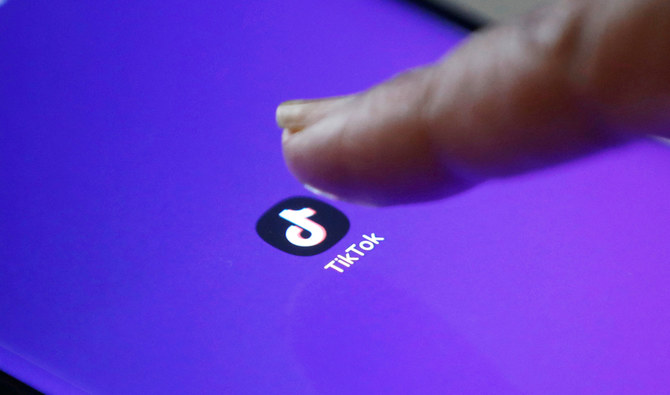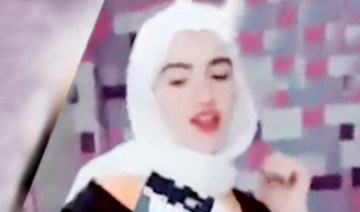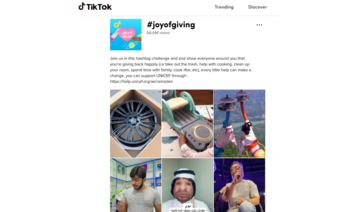DUBAI: Short-form social video-sharing app TikTok has been quite a sensation worldwide, crossing 2 billion downloads globally in April 2020, according to app intelligence provider Sensor Tower.
The Middle East is no exception to TikTok’s growth, with Saudi Arabia ranking as the eighth-largest country in terms of number of users in 2019, as per Route Note.
In 2018, TikTok set up its regional office in Dubai, servicing the Middle East and North Africa.
It has hired local talent such as IBM’s Fahd Osman, Sony’s Gita Ghaemmaghami, Anghami’s Rami Zeidan, and most recently Facebook’s Shant Oknayan as general manager of its parent company ByteDance.
TikTok has been on a journey to diversify its content from dance videos to short-form videos across food, fashion, music, sports, gaming and technology.
“We did that through what we call co-created ideas,” said Rami Zeidan, head of video and creative at TikTok.
The company approached creators with ideas — sometimes in the form of challenges or demo videos — to inspire them to create content across different genres.
For example, Zeidan said, a lot of musicians share their lifestyle — not just their music — on online platforms.
“Now you don’t need to produce a three-minute song to post online. You just open the camera and start singing,” he added.
“There’s a lot of really great Arab talent that are doing great on the platform, singing raw, connecting with people and bringing their personality to life on a guitar.”
COVID-19 has played a major role in influencing content on the app. “We’re seeing an uptick in fitness and health (content) because of COVID-19,” said Zeidan.
It has also led to an increase in tech and gaming content. “We’ve taught creators that you don’t need to do a seven-minute video to review a phone,” he said. “You can do a one-minute video that says ‘here are the 10 things you need to know’.”
As part of its content-diversification plan, TikTok has launched the Creators Academy to mentor and guide creators on various topics such as writing and post-production.
Zeidan gives the example of Mohammed Abbas from Saudi Arabia, who joined TikTok at the end of 2018 as an aspiring actor.
Today, Abbas has over 1.2 million followers thanks to the academy, which led him to become the face of Rotana’s TikTok Ramadan show “Who Said?”
After diversifying its content and coaching its creators, TikTok is turning to advertisers. “Our first priority is to make brands understand that TikTok is a safe environment and a creative haven for creators who are doing great work that can link to everything they (brands) do,” Zeidan said.
He emphasizes the role of the platform for marketing activities across the funnel, from brand awareness to conversions and everything in the middle.
Brands can advertise through different formats using TikTok’s auction system, performance metrics and targeting capabilities.
They can also work directly with TikTok’s team to create a sponsored hashtag or challenge, or by collaborating with creators.
Earlier this year, KitKat ran a campaign in the Gulf Cooperation Council region, partnering with music producer Mojo to create a song and then with creators to push that content.
“This campaign hit 1 billion views, which was the first one in the market,” Zeidan said. “It opened the door for the use of super creators in order for us to create things at scale, and tell the story of a brand in the TikTok way through the people who know TikTok very well.”
The app’s popularity has not immunized it against the challenges of user-generated content on social platforms leading to several privacy and content-moderation issues.
An article by The Intercept in March 2020, based on internal documents obtained by the publication, revealed that moderators were instructed to suppress posts created by users deemed too ugly, poor or disabled for the platform.
When asked about this, Zeidan said: “The only content that gets demoted, blocked or removed from the platform is anything that’s against our community guidelines.”
He added that the app has a three-fold approach to tackle privacy concerns and maintain a safe environment: Empowering users through tools such as parental control and reporting content; a combination of man and machine to moderate content; and partnerships with creators, governments and organizations such as UNICEF to promote positive content.
Commenting on the issue of fake news, which is especially critical during the pandemic, Zeidan said: “This is a digital challenge — for us and all our peers in the market. Our responsibility, as an industry, is to make sure we all put our best processes and resources in place.”
He added: “In an open world, where everybody is creating and uploading content, we need to build the proper infrastructure to minimize the bad incidents as much as possible, and hopefully get to a stage where they’re eliminated; and secondly, amplify great work — whether it’s social responsibility or entertainment — that will enable us to have way more positive content and fulfil our mission of inspiring creativity and bringing joy.”
























